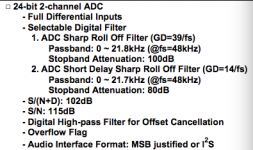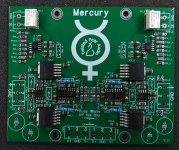I would love to see some AP measurements - yours track closely to my own sound card based measurements - and unfortunately that has been the limiting factor for me. IVY-III for instance measured even better on an AP than it did on my test gear. I am pretty sure Mercury tests the noise floor and ADC precision to an even greater degree.
I modded the ADC path of my USB card and updated my previous measurement of B3+Mercury with more optimistic THD/IMD values 
Index of /pub/Twisted_Pear_Audio_Buffalo_III_DAC_with_Mercury
Note #1: Measured values in dBV are true (i.e. card was calibrated).
Note #2: This must be enough for everyone, why bother with B3Pro... :-D
Index of /pub/Twisted_Pear_Audio_Buffalo_III_DAC_with_Mercury
Note #1: Measured values in dBV are true (i.e. card was calibrated).
Note #2: This must be enough for everyone, why bother with B3Pro... :-D
Last edited:
View attachment 671434
Note #3: I've added a measurement of measurement gear in a loopback (in the same situation as Buffalo 3). It can be seen that B3+Mercury is no worse than that, and it has lower distortion and noise floor. I'm afraid that it is still measurement of ADC and not B3 DAC.
One interesting (or worse?) artefact in these measurement are tiny spikes in high frequencies. I guess they are aliases of high frequency content (MHz?) generated by ES9018 DAC itself. Maybe ES9028 would be better in that...
Compare by yourself:
- http://mr.ieero.com/pub/Twisted_Pear_Audio_Buffalo_III_DAC_with_Mercury/TPA_B3+Mercury@1kHz.png
- http://mr.ieero.com/pub/Twisted_Pea...cury/AudioProbe-Spartan-A-modded-loopback.png
Note #4: The ADC used for measurement uses very good but not perfect JRC 4580 opamps. Also there is AK4621EF ADC that is limiting factor too...
One interesting (or worse?) artefact in these measurement are tiny spikes in high frequencies. I guess they are aliases of high frequency content (MHz?) generated by ES9018 DAC itself. Maybe ES9028 would be better in that...
Compare by yourself:
- http://mr.ieero.com/pub/Twisted_Pear_Audio_Buffalo_III_DAC_with_Mercury/TPA_B3+Mercury@1kHz.png
- http://mr.ieero.com/pub/Twisted_Pea...cury/AudioProbe-Spartan-A-modded-loopback.png
Note #4: The ADC used for measurement uses very good but not perfect JRC 4580 opamps. Also there is AK4621EF ADC that is limiting factor too...
Last edited by a moderator:
Nice work Miero! That is awesome! There is no getting around that pesky ADC limitation (-112db is not actually that bad for that ADC if you look at he datasheet) - but it is so nice to see such an impressive result! Thanks for sharing!
One thing that is super cool is - with the ES9028/38 you can set a register that will completely null out any H2 and H3 (it applies correction) - leaving you with virtually no harmonic distortion. The problem is - the ADC will always tell you small lies.
If you use that register - you need to trust your test gear a lot.
So ES9028/38 with Mercury could be made to measure as close to perfectly as is probably possible.
Cheers!
Russ
One thing that is super cool is - with the ES9028/38 you can set a register that will completely null out any H2 and H3 (it applies correction) - leaving you with virtually no harmonic distortion. The problem is - the ADC will always tell you small lies.
If you use that register - you need to trust your test gear a lot.
So ES9028/38 with Mercury could be made to measure as close to perfectly as is probably possible.
Cheers!
Russ
Attachments
Last edited:
What are the pitfalls of the common mode offset at the dac output that the differential servo tries to correct? Is the only downside excess dissipation via a DC current offset or are there other factors involved?
Also I'm curious, you said there's "good reason" for the board being 4 layers. Since the board is analog, what are these reasons?
Also I'm curious, you said there's "good reason" for the board being 4 layers. Since the board is analog, what are these reasons?
I am curious... do you think only digital circuits benefit from 4 layer PCBs? 
That fact is that just about any high speed circuit can benefit from dedicated power/gnd planes. Sometimes you can do that with 2 layers - sometimes you need a dozen.
The key purpose of the CMS is to make the zero point of the I/V truly zero - that is to say - the amount of current sourced and sunk from the DAC is identical. This has positive effects not only on the DAC (because it is now operating truly symmetrically) but on the AVCC supply. It is a critical part of the design - and it's design is not trivial (like simply taking the midpoint of AVCC) - it accounts for offset errors by design. Even on a DAC the quality of ESS - resistors on silicon aren't perfect.
Mercury is the product of a lot of critical design and most importantly - listening.
Cheers!
Russ
That fact is that just about any high speed circuit can benefit from dedicated power/gnd planes. Sometimes you can do that with 2 layers - sometimes you need a dozen.
The key purpose of the CMS is to make the zero point of the I/V truly zero - that is to say - the amount of current sourced and sunk from the DAC is identical. This has positive effects not only on the DAC (because it is now operating truly symmetrically) but on the AVCC supply. It is a critical part of the design - and it's design is not trivial (like simply taking the midpoint of AVCC) - it accounts for offset errors by design. Even on a DAC the quality of ESS - resistors on silicon aren't perfect.
Mercury is the product of a lot of critical design and most importantly - listening.
Cheers!
Russ
I been listening to Mercury for some time now using my B3SE... and i must say it's really good. Transparency, detail, dynamics - all very good. The only thing i can complain about so far is that Legato while somewhat brighter (which always annoyed me)- has a bit more "meaty" and tad more smooth/musical sound than Mercury at the moment. This usually changes as board sees some use (some burn-in) so if it gets me a bit more bass and less upper treble in time i'll be a happy man.
Trident SRs
Are you using the Trident SRs, especially for the AVCC? I found they add body/weight, without any downsides...
I been listening to Mercury for some time now using my B3SE... and i must say it's really good. Transparency, detail, dynamics - all very good. The only thing i can complain about so far is that Legato while somewhat brighter (which always annoyed me)- has a bit more "meaty" and tad more smooth/musical sound than Mercury at the moment. This usually changes as board sees some use (some burn-in) so if it gets me a bit more bass and less upper treble in time i'll be a happy man.
Are you using the Trident SRs, especially for the AVCC? I found they add body/weight, without any downsides...
I measured 180mA equally on both 15V rails of Placid HD-BP that powers Mercury I/V for Buffalo 3.
Thank you miero
Picture i post #1 will help you.
http://www.diyaudio.com/forums/twisted-pear/314401-introducing-mercury-achieving-escape-velocity.html#post5234272
http://www.diyaudio.com/forums/twisted-pear/314401-introducing-mercury-achieving-escape-velocity.html#post5234272
Picture i post #1 will help you.
http://www.diyaudio.com/forums/twisted-pear/314401-introducing-mercury-achieving-escape-velocity.html#post5234272
yes, I saw that picture. It's kind of blurry. I would like to get clear information.
Edit; never mind, I found the information on Twisted Pear support
Last edited:
Russ, how much important is to have wired resistors raised over PCB? I missed that detail during the soldering.
Not important. I don't think they need to be raised at all.
A question about the orientation of the relays. I Hate to admit it but am guessing. See the attached picture. Is this correct?
Thanks for your help!
Align the pin 1 orientation mark (bar) on the relays to the orientation dot on the PCB.
- Home
- More Vendors...
- Twisted Pear
- Introducing Mercury - Achieving escape velocity.

